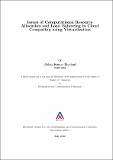Please use this identifier to cite or link to this item:
http://drsr.daiict.ac.in//handle/123456789/258| Title: | Issues of computational resource allocation and load balancing in cloud computing using virtualization |
| Authors: | Chaudhary, Sanjay Bhadani, Abhay Kumar |
| Keywords: | Cloud computing VMware vSphere Virtual computer systems Operating systems Internet Web services Grid Computing Xen Electronic resource Load Balancing Technology |
| Issue Date: | 2009 |
| Publisher: | Dhirubhai Ambani Institute of Information and Communication Technology |
| Citation: | Bhadani, Abhay Kumar (2009). Issues of computational resource allocation and load balancing in cloud computing using virtualization. Dhirubhai Ambani Institute of Information and Communication Technology, x, 68 p. (Acc.No: T00221) |
| Abstract: | With the advent of world wide web, the life of every person has changed drastically. No one can imagine a computer without being connected to the Internet. This dependency is likely to grow in coming years with the adoption of technologies like virtualization and cloud computing. Cloud Computing and Virtualizations one of the foremost technology which has attracted many researchers recently, which is directly going to benefit the end-users and data center service providers. It has many underlying benefits, one of them is directly related to the costs of deploying new servers. Few others are related to harnessing the power of the existing infrastructure and resources. When we look things from server side resource usage, things become quite challenging. Just to meet peak loads, high capacity servers are deployed, which remains underutilized most of the times on an average. With the help of virtualization technique, we can run multiple instances of different operating systems simultaneously. There are many virtualization tools available, which can be used to achieve maximum resource utilization. Making efficient use of computing resource (especially computational time) has always been a critical and challenging task. Several scheduling algorithms have been in place, proposed and implemented on one or other Operating Systems from time to time. But, since we have limited processors and things work in concurrent fashion, overload situation can occur hampering the overall objective, performance and throughput of the system. Things become even more challenging when it comes to distributed systems and load balancing. One of the key commercial player in the virtualization is VMWare, whereas Xen is an open-source free software. There are also few tools like Virtual Box, Linux VServer, OpenVZ, Virtuozzo and few others. Among these the most popular virtual machine monitor is Xen. The likely choice of experimenting with Xen is due to Open Source and wide acceptance by Linux community, and their continuous effort to improve, also it meets the need of industry standards at large. Consider a hypothetical scenario, where multiple instances of operating systems are running and is being used by the clients over the web in the form of cloud service. The user will use the system as if the whole server and/or system is dedicated to him. The user is completely unaware about the actual physical location of the server on which he is running his applications and disk storage space. Since, multiple OS are running on a single physical server, and multiple servers are running in the data centre. All connected via high speed network links. At some instance of time, one server may become overloaded, while other server may remain underutilized. This again poses challenge to distribute the load and make things work perfect in this situation. This situation can be handled using load balancing mechanism over the virtual machines. This thesis work tries to find a mechanism to balance the load based on computational time parameter of the virtual machines. |
| URI: | http://drsr.daiict.ac.in/handle/123456789/258 |
| Appears in Collections: | M Tech Dissertations |
Files in This Item:
| File | Description | Size | Format | |
|---|---|---|---|---|
| 200711033.pdf Restricted Access | 718.3 kB | Adobe PDF |  View/Open Request a copy |
Items in DSpace are protected by copyright, with all rights reserved, unless otherwise indicated.
